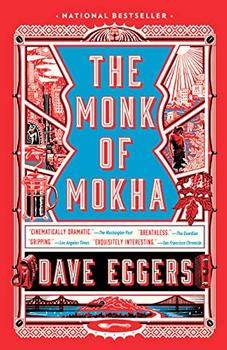Summary | Excerpt | Reading Guide | Reviews | Beyond the Book | Readalikes | Genres & Themes | Author Bio

But visiting coffee farms and farmers around the world, from Costa Rica to Ethiopia, has educated me. Mokhtar educated me. We visited his family in California's Central Valley, and we picked coffee cherries in Santa Barbara—at North America's only coffee farm. We chewed qat in Harar, and in the hills above the city we walked amid some of the oldest coffee plants on earth. In retracing his steps in Djibouti, we visited a dusty and hopeless refugee camp near the coastal outpost of Obock, and I watched as Mokhtar fought to recover the passport of a young Yemeni dental student who had fled the civil war and had nothing—not even his identity. In the most remote hills of Yemen, Mokhtar and I drank sugary tea with botanists and sheiks, and heard the laments of those who had no stake in the civil war and only wanted peace.
After all this, American voters elected—or the electoral college made possible—the presidency of a man who had promised to exclude all Muslims from entering the country—"until we figure out what's going on," he said. After inauguration, he made two efforts to ban travel to the United States by citizens of seven Muslim-majority nations. On this list was Yemen, a country more misunderstood than perhaps any other. "I hope they have wifi in the camps," Mokhtar said to me after the election. It was a grim joke making the rounds in the Muslim American community, based on the presumption that Trump will, at the first opportunity—if there is a domestic terror incident propagated by a Muslim, for instance—propose the registry or even internment of Muslims in America. When he made the joke, Mokhtar was wearing a T-shirt that read MAKE COFFEE, NOT WAR.
Mokhtar's sense of humor pervades everything he does and says, and in these pages I hope to have captured it and how it informs the way he sees the world, even at its most perilous. At one point during the Yemeni civil war, Mokhtar was captured and held in prison by a militia in Aden. Because he was raised in the United States and is steeped in American pop culture, it occurred to him that one of his captors looked like the Karate Kid; when Mokhtar recounted the episode to me, he called the captor the Karate Kid and nothing else. By using this nickname, I don't mean to understate the danger Mokhtar was in, but feel it's important to reflect the outlook of a man who is uniquely difficult to rattle, and who sees most dangers as only temporary impediments to more crucial concerns—the finding, roasting and importing of Yemeni coffee, and the progress of the farmers for whom he fights. And my guess is that this captor did look like the Ralph Macchio of the early 1980s.
Mokhtar is both humble before the history he inhabits and irreverent about his place in it. But his story is an old-fashioned one. It's chiefly about the American Dream, which is very much alive and very much under threat. His story is also about coffee, and about how he tried to improve coffee production in Yemen, where coffee cultivation was first undertaken five hundred years ago. It's also about the Tenderloin neighborhood of San Francisco, a valley of desperation in a city
of towering wealth, about the families that live there and struggle to live there safely and with dignity. It's about the strange preponderance of Yemenis in the liquor-store trade of California, and the unexpected history of Yemenis in the Central Valley. And how their work in California echoes their long history of farming in Yemen. And how direct trade can change the lives of farmers, giving them agency and standing. And about how Americans like Mokhtar Alkhanshali—U.S. citizens who maintain strong ties to the countries of their ancestors and who, through entrepreneurial zeal and dogged labor, create indispensable bridges between the developed and developing worlds, between nations that produce and those that consume. And how these bridgemakers exquisitely and bravely embody this nation's reason for being, a place of radical opportunity and ceaseless welcome. And how when we forget that this is central to all that is best about this country, we forget ourselves—a blended people united not by stasis and cowardice and fear, but by irrational exuberance, by global enterprise on a human scale, by the inherent rightness of pressing forward, always forward, driven by courage unfettered and unyielding.
Excerpted from The Monk of Mokha by Dave Eggers. Copyright © 2018 by Dave Eggers. All rights reserved. No part of this excerpt may be reproduced or reprinted without permission in writing from the publisher.
Your guide toexceptional books
BookBrowse seeks out and recommends the best in contemporary fiction and nonfiction—books that not only engage and entertain but also deepen our understanding of ourselves and the world around us.